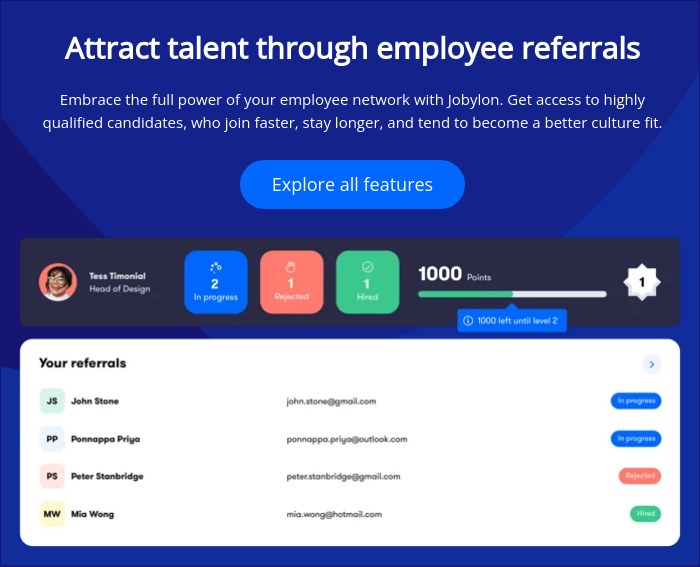Traditional recruitment methods often fall short in attracting high-quality candidates. The ability to attract and retain high-quality employees is directly linked to business success and growth. In recent years, employee referral programs have emerged as a highly effective strategy for sourcing exceptional candidates. These programs leverage the existing networks of employees to tap into a pool of qualified individuals who are more likely to be a culture fit and perform well within the organization. One crucial element of successful referral programs is the use of referral bonuses for employees, which serve as incentives for them to actively participate in the recruitment process and refer potential candidates.
In this article, we will explore the power of employee referral programs, delve into the key features and benefits of referral bonuses, discuss strategies for optimizing referral programs, highlight leading employers' best practices, and provide insights into the future outlook of employee referral bonuses.

Contents
- What is an employee referral bonus?
- The Power of Employee Referral Programs
- Features and Benefits of a Employee Referral Bonus
- Strategies for Optimizing Employee Referral Programs
- Best Practices for Larger Employers
- Closing Thoughts and Future Outlook
What is an employee referral bonus?
An employee referral bonus is a program where companies reward their employees for recommending qualified candidates for job openings. When a referred candidate is hired and meets certain criteria, the referring employee receives a bonus. This benefits the company by attracting potential hires through trusted connections and benefits employees by providing incentives for recruitment efforts. It's a win-win, fostering teamwork and bringing in top talent.
The Power of Employee Referral Programs
Employee referral programs have gained tremendous popularity in recent years due to their ability to attract high-quality candidates. According to our research at Jobylon, 88% of employers believe employee referrals are the best source for finding quality hires. Leveraging existing employees' networks not only expands the talent pool but also increases the chances of finding candidates who are a good fit for the company culture.
Research shows that referred candidates are more likely to be hired and perform better compared to candidates sourced through other channels. Employee referrals have a 45% retention rate after two years, as compared to a 20% retention rate for candidates hired through job boards. This highlights the power of referrals in identifying individuals who are more likely to stay with the company long-term.
Leading companies such as Google, Facebook, and Salesforce have successfully utilized employee referral programs to attract standout candidates. For example, Facebook attributes 33% of its new hires to employee referrals. These success stories reinforce the credibility and effectiveness of referral programs for leading employers.
Features and Benefits of a Employee Referral Bonus
Employee referral bonuses are financial or non-financial rewards given to employees who refer qualified candidates that are subsequently hired by the company. Implementing a well-structured referral bonus program can have several benefits for leading employers.
Key features of effective programs include:
- Clear guidelines and eligibility criteria: Clearly defining the conditions under which employees are eligible for referral bonuses helps to create a fair and transparent process, ensuring equal opportunities for all employees.
- Competitive bonus rewards: In order to incentivize employees to actively participate in the program, it is essential to offer competitive bonus rewards that are attractive enough to motivate employees to refer potential candidates.
- Timely recognition and payout process: Timeliness in acknowledging and rewarding employees for successful referrals is crucial. Delayed or inefficient payout processes can reduce the effectiveness and enthusiasm of the program.
Benefits of offering referral bonuses include:
- Cost-effective hiring: Employee referrals offer a cost-effective alternative to traditional recruitment methods. According to a study by Bersin by Deloitte, referred candidates are hired 55% faster and have a lower cost-per-hire compared to candidates from other sources.
- Higher quality candidates: Referred candidates tend to have a higher quality and are more likely to be a good fit for the company culture. Employees referring their acquaintances and professional networks often serve as a pre-existing reference for the candidates, bringing a level of trust and credibility to the hiring process.
- Improved employee morale and job satisfaction: When employees are actively engaged in the recruitment process and feel that their contributions are valued, it leads to increased job satisfaction and a sense of ownership within the organization. A well-designed referral bonus program can boost overall employee morale and create a positive work environment.
Strategies for Optimizing Employee Referral Programs
To maximize the potential of employee referral programs, it is important to implement effective strategies and best practices. Here are some tips for designing and implementing a successful referral program:
- Effective communication and promotion: Clear and consistent communication about the referral program is vital to ensure employees are aware of the program and its benefits. Regularly promoting the program through various channels, such as email newsletters, team meetings, and internal social platforms, can help generate awareness and participation.
- Simplified referral process: Streamlining the referral process by providing an easy-to-use online referral portal or platform can encourage employees to refer more candidates. Simplifying the process reduces barriers to participation and increases the likelihood of employee engagement.
- Regular tracking and reporting: Tracking and reporting referral metrics are essential to measure the success of the program. By regularly analyzing referral data, HR teams can identify trends, evaluate program effectiveness, and make data-driven decisions to optimize the program.
- Fairness and transparency: It is important to ensure fairness and transparency in the referral program. Clearly communicate the eligibility criteria, referral bonus amounts, and any other relevant guidelines to all employees. This helps promote trust and confidence in the program, encouraging more employees to participate.
- Ongoing evaluation and adaptation: Referral programs should be continuously evaluated and adapted to meet the changing needs of the organization. Regularly review program performance, gather feedback from employees, and make necessary adjustments to improve the program's effectiveness.
Best Practices for Larger Employers
Several leading employers have implemented successful employee referral bonus programs. Let's explore some of their best practices:
Google's employee referral bonus program
Google's referral bonus program is renowned for its generosity and effectiveness. The company offers referral bonuses ranging from $2,000 to $20,000, depending on the position. Google also incorporates gamification elements into its program, such as badges and status levels, to encourage healthy competition and engagement among employees.
Salesforce Leopard
Salesforce has a comprehensive referral program that provides cash bonuses, ranging from $2,000 to $15,000, depending on the role. One unique aspect of Salesforce's program is the "Salesforce Leopard" mascot, representing the company culture and values. Employees who refer successful candidates receive a stuffed leopard as a recognition token.
Airbnb bonuses are a combination
Airbnb's referral program offers both financial and non-financial rewards. Employees who refer successful candidates receive a referral bonus ranging from $2,000 to $5,000, as well as travel credits to use on Airbnb's platform. This combination of both financial and experiential rewards helps to create a more personalized and meaningful experience for employees.
These leading employers demonstrate the value of creating innovative and engaging referral programs that align with their organizational culture and values.
Closing Thoughts and Future Outlook
Employee referral bonus programs offer immense potential for employers who fall short in attracting high-quality candidates and want to attract and retain high-quality talent. The ongoing evolution and improvement of these programs are critical to remain competitive in the talent market. Looking ahead, we can anticipate some future trends in employee referral bonuses, such as the integration of gamification elements or the use of software platforms to streamline and automate the referral process.
In conclusion, employee referral bonus programs have emerged as a powerful strategy for employers to source exceptional candidates and drive business growth. By leveraging the networks of existing employees, companies can tap into a pool of high-quality talent more likely to be a culture fit and perform well within the organization. Implementing a well-structured referral bonus program not only provides cost-effective hiring but also improves employee morale, job satisfaction, and overall engagement. By following best practices and continuously optimizing referral programs, leading employers can capitalize on the potential of employee referral bonuses and stay ahead in the competitive talent market.
To explore further insights and best practices in implementing employee referral bonus programs, feel free to explore our employee referral features or reach out to our team at for assistance.




